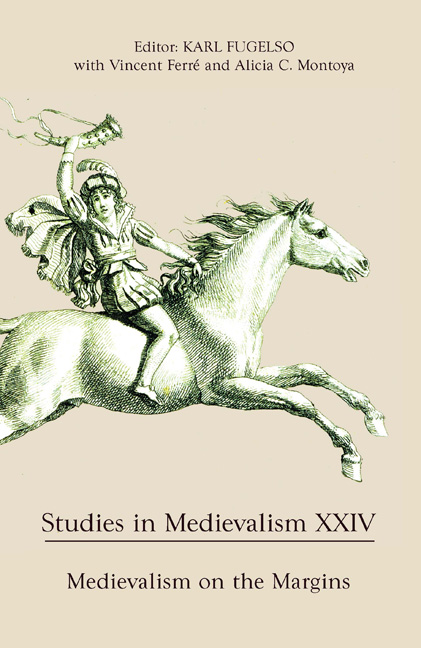Book contents
- Frontmatter
- Acknowledgments
- Contents
- List of Illustrations
- Volume XXIV 2015
- Editorial Note
- I Medievalism on the Margins: Some Perspective(s)
- 1 Medievalism in the Margins: Paratexts and the Packaging of Medieval French Literature
- 2 Medievalism Studies and the Subject of Religion
- 3 Pop Medievalism
- 4 Ecomedievalism: Applying Ecotheory to Medievalism and Neomedievalism
- 5 Whiteness and Time: The Once, Present, and Future Race
- 6 A Desire for Origins: The Marginal Robin Hood of the Later Ballads
- 7 Women, Queerness, and Massive Chalice: Medievalism in Participatory Culture
- 8 “Constant inward looking,” Medieval Devotional Literature, and the Concordium-Fruitlands Library
- II Trans-Atlantic Medievalism(s)
- III Other Interpretations
- Contributors
6 - A Desire for Origins: The Marginal Robin Hood of the Later Ballads
from I - Medievalism on the Margins: Some Perspective(s)
Published online by Cambridge University Press: 05 December 2015
- Frontmatter
- Acknowledgments
- Contents
- List of Illustrations
- Volume XXIV 2015
- Editorial Note
- I Medievalism on the Margins: Some Perspective(s)
- 1 Medievalism in the Margins: Paratexts and the Packaging of Medieval French Literature
- 2 Medievalism Studies and the Subject of Religion
- 3 Pop Medievalism
- 4 Ecomedievalism: Applying Ecotheory to Medievalism and Neomedievalism
- 5 Whiteness and Time: The Once, Present, and Future Race
- 6 A Desire for Origins: The Marginal Robin Hood of the Later Ballads
- 7 Women, Queerness, and Massive Chalice: Medievalism in Participatory Culture
- 8 “Constant inward looking,” Medieval Devotional Literature, and the Concordium-Fruitlands Library
- II Trans-Atlantic Medievalism(s)
- III Other Interpretations
- Contributors
Summary
Robin Hood is certainly one of the main figures whom we associate with medieval culture, medievalism, and neomedievalism. With each new age, it seems, there is a new Robin Hood who is quick to adapt to his contemporary surroundings (or, rather, his creators are purposeful in placing the outlaw into a contemporary political and social context, a space in which the outlaw can navigate the uncertain terrain). While Robin and his greenwood world are grounded signifiers of the Middle Ages, Robin Hood, and Robin Hood studies, have been on the periphery, on the margins, of medieval scholarship for a number of years. Perhaps we should, once and for all, blame William Langland for this unfortunate occurrence: the outlaw's first literary appearance is in one of the most important texts of the Middle Ages, the B-Text of Piers Plowman, passus V, and the representation of the outlaw is none too flattering. Here, Will, the dreamer, encounters Sloth, who is represented as a priest. Sloth does not know his pater noster but he can, astonishingly, recite from memory the “rymes of Robyn hood and Randolf Erl of Chestrre.” We still do not know what Langland meant by “rymes” nevertheless, that a slothful priest knows these works from memory points to their outsider, transgressive status.
While Robin Hood and his literature have always been associated with the Middle Ages, there remain precious few textual remnants of Robin Hood literature that fit into the general timeframe of medieval Europe: Robin Hood and the Monk exists in one manuscript, Cambridge, Cambridge University Library, MS Ff.5.48, which dates to ca. 1465, and there is one manuscript fragment of that poem from the fifteenth century, London, British Library, Bagford Ballads, volume 1, article 6 (C.40); Robin Hood and the Potter (ca. 1468) is found in only one medieval manuscript, Cambridge, Cambridge University Library, MS Ee.4.35; the play Robynhode and the Shryff off Notyngham (ca. 1475) is only found in Cambridge, Trinity College Library, MS R.2.64; no extant manuscript exists for the magisterial poem the Gest of Robyn Hode, yet eight whole and fragmentary versions in early printed books are extant, and the publication of these roughly span the years 1495–1590.
- Type
- Chapter
- Information
- Studies in Medievalism XXIVMedievalism on the Margins, pp. 51 - 62Publisher: Boydell & BrewerPrint publication year: 2015

